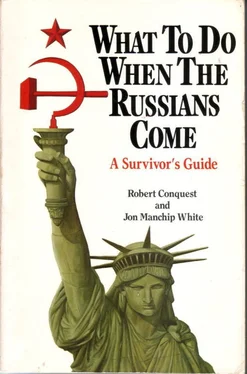Robert Conquest - What to Do When the Russians Come
Здесь есть возможность читать онлайн «Robert Conquest - What to Do When the Russians Come» весь текст электронной книги совершенно бесплатно (целиком полную версию без сокращений). В некоторых случаях можно слушать аудио, скачать через торрент в формате fb2 и присутствует краткое содержание. Город: New York, Год выпуска: 1984, ISBN: 1984, Издательство: Stein and Day Inc., Жанр: Публицистика, на английском языке. Описание произведения, (предисловие) а так же отзывы посетителей доступны на портале библиотеки ЛибКат.
- Название:What to Do When the Russians Come
- Автор:
- Издательство:Stein and Day Inc.
- Жанр:
- Год:1984
- Город:New York
- ISBN:0-8128-2985-9
- Рейтинг книги:3 / 5. Голосов: 1
-
Избранное:Добавить в избранное
- Отзывы:
-
Ваша оценка:
- 60
- 1
- 2
- 3
- 4
- 5
What to Do When the Russians Come: краткое содержание, описание и аннотация
Предлагаем к чтению аннотацию, описание, краткое содержание или предисловие (зависит от того, что написал сам автор книги «What to Do When the Russians Come»). Если вы не нашли необходимую информацию о книге — напишите в комментариях, мы постараемся отыскать её.
What to Do When the Russians Come — читать онлайн бесплатно полную книгу (весь текст) целиком
Ниже представлен текст книги, разбитый по страницам. Система сохранения места последней прочитанной страницы, позволяет с удобством читать онлайн бесплатно книгу «What to Do When the Russians Come», без необходимости каждый раз заново искать на чём Вы остановились. Поставьте закладку, и сможете в любой момент перейти на страницу, на которой закончили чтение.
Интервал:
Закладка:
However, you will probably not wish to go to China (unless, perhaps, you go to Hong Kong or Taiwan). Japan would be a better bet, as would the Philippines, Australia, or New Zealand. We recommend the Southern Hemisphere, in any case, as less liable to fallout in a Soviet-Chinese nuclear war.
At any rate, there may be a possibility for you to escape to less oppressive climes while you can. The Soviets may demand the return of certain people as “war criminals,” but lesser figures, especially if they can get false names and papers, may manage.
In your new home, there will inevitably be occasional friction, and you will feel yourself a second-class citizen. Eventually, Communist agents may approach you, pointing to declarations from Soviet Washington promising complete amnesties to émigrés who return. You may be tempted if things are not going well for you. Resist this temptation; except in a few showcases, such promises have always been broken once the returnee is back in Communist hands.
Even after the occupation of America, but especially when five or ten years have passed, you will find your hosts in your new country becoming extraordinarily oblivious to the Soviet threat.
Many will believe Communist propaganda stories about the happy new life in the United States. Others, not quite so naive, will still think there is something in it and feel that you are exaggerating when you tell the true story. Still others (such is the tendency to self-deception found in these circumstances) will believe that it was all or partly America’s fault; and that anyhow it cannot be helped. And there will be powerful voices, even among those conducting or discussing foreign policy at a high level, saying that the Soviets are basically reasonable and, if treated with friendship, pose no further threat.
You may say to yourself that they have one excuse: There were people in America who spoke the same way before the disaster.
You will feel it your duty to do what you can to warn your hosts of their own imminent danger. It will not only be a duty, but in your own interest, as the eventual arrival of Soviet troops in your new homeland will be a disaster facing you with no choice but to fight it out to the end, unless you can conceal your origins.
Even so, you will have gained a few years respite—like millions of others throughout the world today. And—who knows?—the interval might just possibly be long enough for the beginning of the inevitable eventual breakup of the Soviet empire to take place first.
When you arrive as a refugee, do not expect too much. However friendly your new host country, it may have no place for your trade or profession not already taken up by one of its present citizens. Be prepared to start again at a low level and work your way up as best you can.
You may even find yourself having to live, as so many millions have in our time, in squalid refugee camps with your whole family in a tent or under a couple of sheets of corrugated iron. Even here, count your blessings; you are a thousand times better off than you would be in the Athabasca labor camps. After the Russian revolution many émigrés came to Paris. Princes who had lived amidst great privilege became waiters and were glad of the chance. But in any case, this escape will be open to few.

4. AT HOME
WE THOUGHT IT best to begin with some advice in coping with the more immediate dangers. However, harder problems will in some ways eventually await those who have not been arrested, or whose arrest is still in the future.
Most people will find that they have to pick themselves up and somehow carry on with their lives. A few, mainly unattached young men, will be able to escape or join the partisan bands, but a family man or a working mother is likely to find that there is no alternative to simply staying put and getting on with their job or with whatever new job they may have been able to get. Fitting into the new order without encountering disaster is going to be a hazardous and wearing experience.
First of all, let us consider the problems that will face you, the ordinary citizen, in your everyday existence. What sort of scene might you expect to see around you as you strive to pick up the after the catastrophe?
Your situation will be squalid for a long time ahead. As conquerors, the Russians have never shown the slightest inclination to be magnanimous. They will squeeze America dry, and they won’t waste any time doing it. We would estimate that in five years, say, after the Occupation, the United States will be shabby, hungry, and cowed. Even that will be an improvement over what it was like immediately after the collapse.
In this connection, it might be instructive for you to acquaint yourself with what was happening in South Vietnam, particularly Saigon, when calamity overwhelmed it. Here was a pro-Western country struck down by a remorseless Soviet-sponsored Communist enemy. The final scenes of defeat might well resemble those that will occur in American cities in the first days. The reconstruction period, with its execution squads and reeducation camps, may bear a close similarity with American events, even allowing for the differences of place, time, and background.
• Many of the more prominent features of the new landscape you will inhabit are easy to predict:
• Apart from the purely military destruction, the economy will be thoroughly disrupted.
• Businesses producing anything except the barest necessities will, almost without exception, collapse.
• Oil will no longer be imported. Most domestic American oil will be earmarked for official purposes.
• Nationalization of all major firms will take place almost at [once.] Small firms will face the same fate within a year or two.
• Personal savings will be wiped out by the “currency reforms” that will reduce the value of the dollar to one-fiftieth or one-hundredth of the new Red dollar, which alone will be valid thereafter.
• American grain, which has already frequently prevented food [shortages] within the Soviet Union in past years (shortages brought about by the inefficiency of Soviet agriculture), will be abroad in great quantities. The Russians will take whatever other foodstuffs they want, and food shortages will result in United States—aggravated by the new agricultural system (see p. 68).
• Large amounts of engineering equipment will be removed to the USSR, often with American technicians attached, as “war reparations” or under some other quasi-legal excuse or will be “purchased” at prices dictated by the Soviets. This would follow the pattern of the dismantling and removal of equipment from Germany and Manchuria in 1945.
One of the first results of Soviet-style “planning” will be an immense expansion of economic bureaucrats and administrators, leading to a corresponding fall off in efficiency. Even the derisory amounts of raw materials that your firm or factory may have been allocated will have been wrongly forecast, and they will never arrive when they are supposed to. Wherever you work, you will encounter severe dislocations and will live in an atmosphere of increasing pressure, corner cutting, faking of results, and so on. The general effects of this on the attitude and morale of you and your fellow workers will be vicious.
Yet there will be a period of brief leeway of which you should take every possible advantage. There will be weeks, even months, during which the occupation forces will be settling down and establishing themselves. The first days will naturally be highly perilous from the point of view of rape, murder, random shootings, and summary executions; but the local commandants will have too many other pressing problems to take over all the stores and smaller businesses immediately. Of course, there will be certain concerns that will peter out at once, such as real estate, others will struggle on with a diminishing stock of goods. The stores alone will be encouraged to keep up their supplies to level and will even be encouraged to replenish their shelves from their contacts in the countryside.
Читать дальшеИнтервал:
Закладка:
Похожие книги на «What to Do When the Russians Come»
Представляем Вашему вниманию похожие книги на «What to Do When the Russians Come» списком для выбора. Мы отобрали схожую по названию и смыслу литературу в надежде предоставить читателям больше вариантов отыскать новые, интересные, ещё непрочитанные произведения.
Обсуждение, отзывы о книге «What to Do When the Russians Come» и просто собственные мнения читателей. Оставьте ваши комментарии, напишите, что Вы думаете о произведении, его смысле или главных героях. Укажите что конкретно понравилось, а что нет, и почему Вы так считаете.












